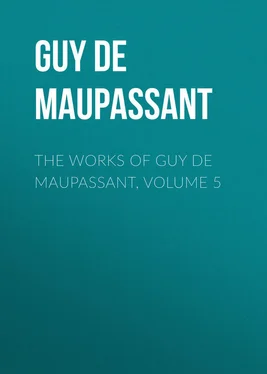Guy Maupassant - The works of Guy de Maupassant, Volume 5
Здесь есть возможность читать онлайн «Guy Maupassant - The works of Guy de Maupassant, Volume 5» — ознакомительный отрывок электронной книги совершенно бесплатно, а после прочтения отрывка купить полную версию. В некоторых случаях можно слушать аудио, скачать через торрент в формате fb2 и присутствует краткое содержание. Жанр: literature_19, foreign_antique, foreign_prose, на английском языке. Описание произведения, (предисловие) а так же отзывы посетителей доступны на портале библиотеки ЛибКат.
- Название:The works of Guy de Maupassant, Volume 5
- Автор:
- Жанр:
- Год:неизвестен
- ISBN:нет данных
- Рейтинг книги:3 / 5. Голосов: 1
-
Избранное:Добавить в избранное
- Отзывы:
-
Ваша оценка:
- 60
- 1
- 2
- 3
- 4
- 5
The works of Guy de Maupassant, Volume 5: краткое содержание, описание и аннотация
Предлагаем к чтению аннотацию, описание, краткое содержание или предисловие (зависит от того, что написал сам автор книги «The works of Guy de Maupassant, Volume 5»). Если вы не нашли необходимую информацию о книге — напишите в комментариях, мы постараемся отыскать её.
The works of Guy de Maupassant, Volume 5 — читать онлайн ознакомительный отрывок
Ниже представлен текст книги, разбитый по страницам. Система сохранения места последней прочитанной страницы, позволяет с удобством читать онлайн бесплатно книгу «The works of Guy de Maupassant, Volume 5», без необходимости каждый раз заново искать на чём Вы остановились. Поставьте закладку, и сможете в любой момент перейти на страницу, на которой закончили чтение.
Интервал:
Закладка:
Guy de Maupassant
The works of Guy de Maupassant, Vol. 5 Une Vie and Other Stories
INTRODUCTION
The most robust and masculine of recent French novelists is a typical Norman, sprung from an ancient noble family, originally of Lorraine, but long settled in the Pays de Caux. The traveler from England towards Paris, soon after leaving Dieppe, sees on his left hand, immediately beyond the station of St. Aubin, a handsome sixteenth-century house, the Château de Miromesnil, on a hill above the railway. Here, surrounded by the relics of his warlike and courtly ancestors, Henri René Albert Guy de Maupassant was born on the 5th of August, 1850. He was early associated with the great Norman master of fiction, Gustave Flaubert, who perceived his genius and enthusiastically undertook the training of his intelligence. Through 1870 and 1871 the young man served in the war as a common soldier. He was somewhat slow in taking up the profession of letters, and was thirty years of age before he became in any degree distinguished. In 1879 the Troisième Théâtre Français produced a short play of his, Histoire du Vieux Temps (An Old-World Story), gracefully written in rhyme, but showing no very remarkable aptitude for the stage.
It was in 1880 that De Maupassant was suddenly made famous by two published volumes. The one was a volume of Verses ( Des Vers ), twenty pieces, most of them of a narrative character, extremely brilliant in execution, and audacious in tone. One of these, slightly exceeding its fellows in crudity, was threatened with a prosecution in law as an outrage upon manners, and the fortune of the volume was secured. The early poems of De Maupassant like those of Paul Bourget, are not without sterling merit as poetry, but their main interest is that they reflect the characteristics of their author's mind. Such pieces as "Fin-d'Amour," and "Au Bord de l'Eau," in the 1880 volume, are simply short stories told in verse, instead of in prose. In this same year, Guy de Maupassant, who had thrown in his lot with the Naturalist Novelists, contributed a short tale to the volume called Les Soirées de Médan , to which Zola, Huysmans, Hennique, Céard and Paul Alexis also affixed their names. He was less known than any of these men, yet it was his story, Boule de Suif (Lump of Suet, or Ball of Fat), which ensured the success of the book. This episode of the war, treated with cynicism, tenderness, humor and pathos mingled in quite a new manner, revealed a fresh genius for the art of narrative. There was an instant demand for more short stories from the same pen, and it was soon discovered that the fecundity and resource of the new writer were as extraordinary as the charm of his style and the objective force of his vision.
It is unnecessary to recount here the names of even the chief of De Maupassant's stories. If we judge them merely by their vivacity, richness and variety, they are the best short tales which have been produced anywhere during the same years. But it is impossible not to admit that they have grave faults, which exclude them from all possible recommendation to young and ingenuous readers. No bibliography of them can be attempted, the publishers of M. Guy de Maupassant having reprinted his lesser stories so frequently, and with such infinite varieties of arrangement, that the positive sequence of these little masterpieces has been hopelessly confused. Three stories in particular, however, may be mentioned, La Maison Tellier , 1881; Les Sœurs Rondoli , 1884, and Miss Harriett , 1885, because the collections which originally bore these names were pre-eminently successful in drawing the attention of the critics to the author's work.
It was not until he had won a very great reputation as a short story-teller, that De Maupassant attempted a long novel. He published only six single volume stories, all of which are included in the present edition. The first was Une Vie (A Life), 1883, a very careful study of Norman manners, highly finished in the manner of Flaubert, whom he has styled "that irreproachable master whom I admire above all others." In certain directions, I do not think that De Maupassant has surpassed Une Vie , in fidelity to nature, in a Dutch exactitude of portraiture, in a certain distinction of tone; it was the history of an unhappy gentlewoman, doomed throughout life to be deceived, impoverished, disdained and overwhelmed. Bel-Ami , 1885, which succeeded this quiet and Quaker-colored book, was a much more vivid novel, an extremely vigorous picture of the rise in social prominence of a penniless fellow in Paris, without a brain or a heart, who depends wholly upon his impudence and his good looks. After 1885 De Maupassant published four novels — Mont-Oriol , 1887; Pierre et Jean , 1888; Fort comme la Mort (As Strong as Death , or The Ruling Passion), 1889; and Nôtre Cœur (Our Heart), 1890.
Of these six remarkable books, the Pierre et Jean is certainly the most finished and the most agreeable. In Mont-Oriol , a beautiful landscape of Auvergne mountain and bath enshrines a singularly pessimistic rendering of the adage "He loved and he rode away." Few of the author's thoughtful admirers will admit that in Fort comme la Mort he has done justice to his powers. In Nôtre Cœur he has taken up one of the psychological problems which have hitherto lain in the undisputed province of M. Bourget, and has shown how difficult it is in the musky atmosphere of fashionable Paris for two hearts to recover the Mayday freshness of their impulses, the spontaneous flow of their illusions; he displays himself here in a new light, less brutal than of old, more delicate and analytical. With regard to Pierre et Jean , it would be difficult to find words wherewith to describe it and its relation to the best English fiction more just or more felicitous than those in which Mr. Henry James welcomed its first appearance: – " Pierre et Jean is, so far as my judgment goes, a faultless production… It is the best of M. de Maupassant's novels, mainly because M. de Maupassant has never before been so clever. It is a pleasure to see a mature talent able to renew itself, strike another note, and appear still young… The author's choice of a milieu , moreover, will serve to English readers as an example of how much more democratic contemporary French fiction is than that of his own country. The greater part of it – almost all the work of Zola and of Daudet, the list of Flaubert's novels, and the best of those of the brothers De Goncourt – treat of that vast, dim section of society, which, lying between those luxurious walks on whose behalf there are easy suppositions and that darkness of misery which, in addition to being picturesque, brings philanthropy also to the writer's aid, constitutes really, in extent and expressiveness, the substance of every nation. In England, where the fashion of fiction still sets mainly to the country-house and the hunting-field, and yet more novels are published than anywhere else in the world, that thick twilight of mediocrity of condition has been little explored. May it yield triumphs in the years to come!"
The great merit of M. de Maupassant as a writer is his frank and masculine directness. He sees life clearly, and he undertakes to describe it as he sees it, in concise and vigorous language. He is a realist, yet without the gloominess of Zola, over whom he claims one great advantage, that of possessing a rich sense of humor, and a large share of the old Gallic wit. His pessimism, indeed, is inexorable, and he pushes the misfortune, or more often the degradation, of his characters to its extreme logical conclusion. Yet, even in his saddest stories, the general design is rarely sordid. For a long while he was almost exclusively concerned with impressions of Normandy; a little later he became one of the many painters of Paris. Then he traveled widely, in the south of Europe, in Africa; wherever he went he took with him a quick and sensitive eye for the aspects of nature, and his descriptive passages, which are never pushed to a tiresome excess of length, are often faultlessly vivid. He attempted, with a good deal of cleverness, to analyze character, but his real power seems to lie in describing, in a sober style and with a virile impartiality, the superficial aspects of action and intrigue.
Читать дальшеИнтервал:
Закладка:
Похожие книги на «The works of Guy de Maupassant, Volume 5»
Представляем Вашему вниманию похожие книги на «The works of Guy de Maupassant, Volume 5» списком для выбора. Мы отобрали схожую по названию и смыслу литературу в надежде предоставить читателям больше вариантов отыскать новые, интересные, ещё непрочитанные произведения.
Обсуждение, отзывы о книге «The works of Guy de Maupassant, Volume 5» и просто собственные мнения читателей. Оставьте ваши комментарии, напишите, что Вы думаете о произведении, его смысле или главных героях. Укажите что конкретно понравилось, а что нет, и почему Вы так считаете.












